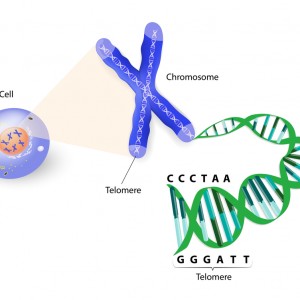Pulmonary Fibrosis, Emphysema Caused By Stem Cell Failure Due to Shortened DNA Component

 In a new study entitled “Telomere dysfunction causes alveolar stem cell failure,” a research team identified that short telomeres in lung stem cells induce stem cell failure, leading to the underlying cause of diseases like pulmonary fibrosis and emphysema. The study was published in the journal Proceedings of the National Academy of Sciences.
In a new study entitled “Telomere dysfunction causes alveolar stem cell failure,” a research team identified that short telomeres in lung stem cells induce stem cell failure, leading to the underlying cause of diseases like pulmonary fibrosis and emphysema. The study was published in the journal Proceedings of the National Academy of Sciences.
Pulmonary fibrosis and emphysema are prevalent in individuals with short telomeres, however, the reason for this association remains unknown. Here, researchers at the Johns Hopkins University School of Medicine linked this phenotype to premature aging of stem cells in the lungs due to shortened telomeres — the caps at the end of each strand of DNA to protect chromosomes from deteriorating or to fusing with neighboring chromosomes.
The team performed studies in mice and found that stem cells with short telomeres become senescent, triggering an inflammatory response leading to impaired lung maintenance and repair. The authors observed that stem cells harboring short telomeres cannot divide and proliferate so that when lungs are exposed to drugs or infectious agents, as in the case of a viral infection, the short telomeres render mice lung cells much more vulnerable to damage, technically known as “insults.” This is because the stem cell pool in the lungs is defective and cannot proliferate to replenish the lost cells.
These results explain why certain individuals develop respiratory failure after infections, even though they exhibited no signs of pulmonary disease. The answer, the team discovered, resides in stem cells’ short telomeres. The team performed their studies in a mouse model engineered to harbor short-telomeres only in the lung stem cells in the alveolar epithelium. They found that these stem cells did not die, but were unable to divide and proliferate, leaving the alveolar epithelium damaged. Accordingly, after mice with defected stem cells were administered eleven different drugs, they rapidly became extremely ill and died within a month.
The team showed that within two weeks, while normal-telomere harboring stem cells generated 425 structures from 5,000 healthy stem cells, the short-telomere senescent stem cells generated 5 of these structures.
The team is now focusing their study to understand if cigarette smoking, the main cause of emphysema, is also related to premature aging of stem cells.







